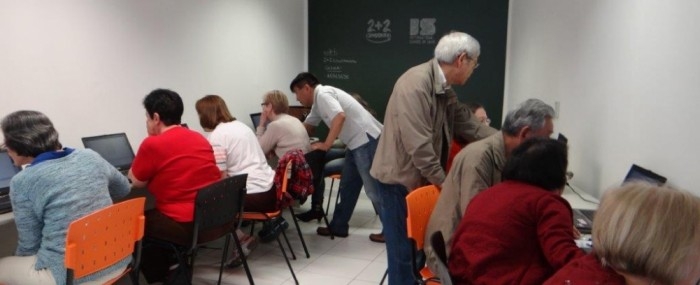

The study involved a control group and a third group of people who learned to play video games. The average age was 65 (photo: Fabio Ota)
The study involved a control group and a third group of people who learned to play video games. The average age was 65.
The study involved a control group and a third group of people who learned to play video games. The average age was 65.

The study involved a control group and a third group of people who learned to play video games. The average age was 65 (photo: Fabio Ota)
FAPESP Research for Innovation – Information technology can be a powerful tool for preserving the cognitive functions of people over 60 years of age. This proposition was the basis of Fabio Ota’s initiative, which was undertaken in a research project supported by FAPESP’s Innovative Research in Small Business (PIPE) to test the benefits of teaching game programming techniques to a group of 46 people over the age of sixty, with the aim of developing logical reasoning and preventing cognitive decline.
Ota graduated with a degree in information technology (IT) from the São Paulo College of Technology (FATEC) and has an MBA in strategic IT management from Fundação Getúlio Vargas (FGV). He conceived a digital inclusion project for the elderly in 2001. The idea of using game programming to stimulate cognition in older people began taking shape in 2014 when he established the International School of Game (ISGame), the trading name for the firm Eliza Massako Akiyama Ota, in São Paulo, and began teaching game development to young people. In 2015, he organized a course for 14 people over the age of fifty as part of the UniversIDADE program run by the University of Campinas (UNICAMP), and he submitted a project to FAPESP’s PIPE Program in the same year, to test the methodology.
In the project approved by PIPE, games were programmed by using 2D software that does not require coding. “The challenge begins with planning of the various levels of the game,” says Ota, CEO of ISGame. “It continues with development of the storyline and choosing the objects to be used in each game level until the end product is ready.” This set of tasks requires both creativity and logical reasoning, he adds.
The study lasted nine months and was completed in February 2017. In addition to the group of older people charged with developing the game, the research project involved a control group (15 people) and a group of players (14 people) who learned to play video games. The average age across all groups was 65. Most participants had a university degree, and there were no statistically significant differences in terms of family structure, health or financial status, among other criteria used to construct the sample population.
Several well-known tests were run to measure and compare the performances of the three groups, including the Mini-Mental State Examination (MMSE), Trail Making Test (TMT) and Scenery Picture Memory Test (SPMT). The parameters evaluated included spatial and temporal orientation, immediate and evocation memory, language (naming), repetition, comprehension, writing and copy drawing.
“After the course, the group of game developers performed significantly better than the control and player groups,” Ota says, referring to indicators of mental health, quality of life, cognition and functional capacity.
Some participants recognized the improvement. In interviews with the researchers, they mentioned “better concentration”, “more coordination”, “improved memory”, “mental agility”, “creativity” and “sociability”.
In fact, socialization was a secondary aim of the project. The idea was to provide an environment during the course that would encourage the group to take on ordinary everyday tasks and challenges and bolster their self-esteem. “At the end of the course, they invited their children and grandchildren to try out the games they had developed,” Ota explains. “It was surprising to see grandparents teaching grandchildren how to go through the game levels.”
“Having confirmed the effectiveness of the methodology, we’re expanding the number of courses for older people. At present, we have 40 participants in Campinas and 40 in São Paulo. And , we’re about to conclude an important partnership that will enable us to admit 250 more people.”
International School of Game (ISGame)
Site: isgame.com.br
Facebook: facebook.com/InternationalSchoolOfGame
E-mail: contato@isgame.com.br
Republish
The Agency FAPESP licenses news via Creative Commons (CC-BY-NC-ND) so that they can be republished free of charge and in a simple way by other digital or printed vehicles. Agência FAPESP must be credited as the source of the content being republished and the name of the reporter (if any) must be attributed. Using the HMTL button below allows compliance with these rules, detailed in Digital Republishing Policy FAPESP.




